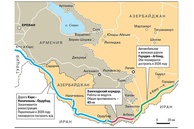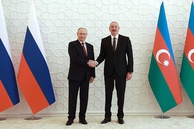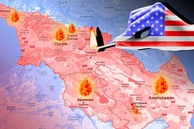The sharp deterioration of Russian-Azerbaijani relations in 2024-2025 is a clear example of how Baku’s strong dependence on Britain hamstrings the freedom of its foreign policy, forcing the country’s ruling elite to choose in favor of Western partners even at the expense of traditional regional ties. The escalation of the conflict with Russia following the December 2024 crash of an Azerbaijani passenger plane near Grozny, the detention of members of ethnic Azerbaijani criminal groups, all of them Russian citizens, in Yekaterinburg in June 2025 laid bare the structural limitations [1] that Azerbaijani President Ilham Aliyev faces as he tries to pursue a balanced regional policy.
From a plane crash to a diplomatic crisis
The subsequent events demonstrate just how much Baku's reaction to Moscow’s actions is dictated by its need to accommodate London's interests in the region.
On December 25, an Azerbaijan Airlines passenger plane was heading from Baku to Grozny. Just as it was attempting to land at the Grozny airport, the region, including Mozdok and Vladikavkaz, came under attack by Ukrainian drones. The crew started losing control of the aircraft after it suffered some external influence. Russian airports were clearing the sky and runways to allow an emergency landing of the troubled Azerbaijani plane.
The crew decided to change course and land at the airport in the Kazakh city of Aktau, but the plane eventually crashed, killing 38 people on board, including seven Russian nationals. According to the preliminary transcript of the crashed airliner’s cockpit voice recorder, the crew informed the Russian air traffic controllers about a possible collision with birds. However, immediately after the incident, President Ilham Aliyev went on record saying that the airliner had been hit by Russian air defense systems in the Grozny area resulting in the crew losing control of the plane. However, he ignored that fact that the tragic situation was provoked by a targeted attack by Ukrainian UAVs on civilian objects, which certainly include airports in the region. Moreover, the Ukrainian drone operators deliberately timed the attack to coincide with the approach of a civilian plane to the airport. The attack was obviously meant to provoke a catastrophe and turn Azerbaijan against Russia. Notably, on that very same day, President Aliyev’s plane was in the air and also had problems with GPS navigation. [2] Aliyev was on his way to Russia for participation in a CIS summit. His plane, which took off almost simultaneously with the one that crashed, immediately returned to Baku. Apparently, someone had warned the crew to turn back. The Azerbaijani leader confirmed [3] that the incident was not an attack on his plane. It is assumed that, incensed by the threat to his life, Aliyev set his country’s media against Russia, while making no claims against Ukraine. Russia offered neither immediate comment nor apology for the incident until the causes of the catastrophe were clarified. Baku, for its part, did everything to turn a tragic technical error into a political problem, an accidental incident into a revision of relations with Russia. President Vladimir Putin did apologize, though, despite the fact that the data from the black boxes had not yet been deciphered. However, Baku was quick to unleash a vicious anti-Russian campaign.
The situation came to a head on June 27, 2025 following mass-scale detentions in Russia’s Yekaterinburg of an organized crime group made up of members of the local Azerbaijani diaspora. During the sting operation, brothers Ziyaddin and Gusein Safarov died (one of them, preliminarily, as a result of heart failure, while the cause of death of the other is being established), [4] This brought about an unprecedentedly harsh reaction from Baku, which cancelled all Russian cultural events, arrested the heads of the Sputnik Azerbaijan agency and detained eight Russian citizens in an extremely brutal manner on “charges of drug trafficking and cybercrime”.
However, Baku never protested to Kyiv after the Ukrainian security forces shot and killed two Azerbaijani citizens suspected of murdering SBU Colonel Ivan Voronich. [5]
Unfortunately, President Aliyev’s statements clearly demonstrate his readiness to always act in the interests of forces hostile to Russia. As if responding to a Western request to publicly discredit Moscow, he announced [6] that Baku was going to file an international lawsuit against Russia. Aliyev also called [7] on the Kiev regime "not to put up with the occupation" and suggested that the Ukrainians work out a plan to claw back its territory, just as the Azerbaijanis did in the case of Nagorno-Karabakh. The call reflects President Aliyev’s desire to integrate the republic into the anti-Russian architecture created by the Western alliance in the South Caucasus.
Meanwhile, in another Trans-Caucasus republic, Armenia, the authorities, albeit with certain reservations, are also dialing up their anti-Russian rhetoric. They arrested Russian businessman and philanthropist Samvel Karapetyan, with the Armenian Foreign Ministry protesting to Russia [8] over Moscow’s alleged calls for the release of Karapetyan, who also holds Armenian citizenship, describing them as interference in Armenia's internal affairs and a threat to its sovereignty and democracy. To top it all off, the authorities accused the opposition of preparing a coup with alleged Russian support. [9]
Attempts to open a second front
These virtually simultaneous crises in Russia's relations with the two Trans-Caucasus republics, despite the fact that Moscow did so much to ease traditional tensions between the two, were hardly coincidental. Most likely, this is part of a concerted Western plan directed against the Russian Federation. The idea of opening a "second front" against our country in the Trans-Caucasus region has haunted Western sponsors since the very start of Russia’s special military operation in Ukraine. Indeed, Western representatives once suggested to Georgia’s ex-Premier Irakli Garibashvili to start a war with Russia. [10] According to him, he was openly offered to sacrifice his country in order to stretch out Russian forces. The attempted coup in Georgia was undertaken after Tbilisi flatly refused to act against Russia.
The West continued its attempts to enmesh Russia in a new conflict, this time in the South Caucasus. The British secret services took up the matter with their heads, Bill Burns and Richard Moore, for the first time speaking in public about the close cooperation between the CIA and MI6 [11] and publishing a joint article in The Financial Times. [12]) They tried to create a situation for the Russian peacekeepers where any further move would only worsen their position.
That MI6 played a coordinating role on the Caucasus track is nothing new. Before he was appointed the head of Britain’s intelligence service, Richard Moore served as Britain’s ambassador to Turkey and is considered a close friend of President Erdogan. Earlier, he had a long stint coordinating British intelligence activities in Turkey, and played a significant role in building ties with Erdogan and his main ally in the region - Azerbaijan, and later with Armenia.
It is very likely that in December 2022, MI6 worked with both conflicting parties, which resulted in Baku blocking the Lachin corridor - the only road connecting Nagorno-Karabakh with Armenia. Pro-ecology activists set up pickets in Karabakh, which Yerevan had already recognized as part of Azerbaijan. Russian peacekeepers had no right to interfere in the domestic civil protests inside Azerbaijan, of course. Meanwhile, the Armenian leadership demanded that Moscow use force to unblock the Lachin corridor and refused to open the Zangezur corridor connecting Azerbaijan with Nakhichevan. Apparently, the game played by the British was to force Russian peacekeepers to enter into a conflict with Azerbaijan or to discredit them before the Armenians in a bid to ensure the further withdrawal of the Russian military contingent from the region. With Baku and Yerevan diligently and consistently playing out the roles prescribed them in the British scenario, the Russian peacekeepers had to leave Karabakh. Today, the collective West is once again pitching the idea of the "Trans-Caucasus Front," according to which the armed forces of European NATO countries will be ready to go to war with Russia only by 2028-2030. [13] Because it is becoming clear that the Kiev regime will not last that long, it is imperative to divert some of the Russian forces and resources from the Ukrainian front. Destabilizing Moscow’s relations with the Trans-Caucasus republics is exactly what the West needs, since it does not presuppose any direct participation in this by NATO or EU members.
Control over the Zangezur Corridor
Plan B, which the West has up its sleeve in case it fails to provoke an armed conflict, is to gain additional leverage for its geopolitical dominance by phasing Russia and Iran out of the region and preventing China from gaining strength. In other words, the West is interested in disrupting the Russian North-South geo-project and establishing its supervision over China’s One Belt, One Road project through control over the Zangezur corridor.
However, the Trilateral Statement of November 9, 2020 [14] stipulates that control over such an important transport artery for the West as the Zangezur corridor is to be exercised by Russian border guards. This goes against the Western plans, according to which the route should become part of a more global project, the Middle Corridor, whose main purpose is to control and export Asian (primarily Chinese) goods to Europe. With Russia currently under European sanctions and its interaction with EU countries seriously limited, a route from China and other Asian countries bypassing Russia is of fundamental importance to the European Union. London and Washington view the South Caucasus as a key hub and the main sore point of Eurasian integration, which links Russia, Iran, Turkey, and China. Judging by the concerted anti-Russian actions of Baku and Yerevan, Britain has probably tasked Aliyev and Pashinyan with speeding up Russia’s withdrawal from the South Caucasus, including its military presence. Armenia’s Deputy Foreign Minister Mnatsakan Safaryan said [15] that regardless of the Trilateral Statement, the Zangezur Corridor project will be implemented without Russia's participation, thus handing control over the transport route to a private US structure, or possibly to the Turkish side. The Spanish online media platform Periodista Digital claims, citing sources, that Armenia, Azerbaijan and the United States have agreed a memorandum of understanding to set up the Zangezur corridor, which they refer to as the "Trump Bridge."
The unwarranted escalation of tensions with Russia in both republics suggests that their authorities are preparing the public opinion for a possible cancellation of previously reached agreements.
Judging by the large-scale anti-Russian campaign inspired in Azerbaijan, the country has been assigned a central role in this plan. The British special services are now working hard to ensure the maximum possible escalation of the conflict and the current changes in Baku’s information policy vis-à-vis Russia reveal the British curators’ influence on the formation of public opinion in Azerbaijan.
They provide Aliyev with massive information support through the British media, which literally churns out articles, reports and analytical materials bemoaning the "trampled honor of the Azerbaijanis." [16]
The British media machine diligently covers up human rights violations in Azerbaijan and instills in the Western audience the need to support the government. It should be noted here that Azerbaijan spends more than three million pounds annually on advertising in the British media, including sponsored sections in The Times, The Financial Times and The Telegraph. The money provides commercial incentives for a favorable coverage of Azerbaijan’s interests.
To better understand the reason why the British are so adept at manipulating Baku to the detriment of the republic’s traditional ties in the region, one needs to delve into Britain's centuries-old interest in Azerbaijani oil.
Financial and economic foundations of Azerbaijan's dependence
British money started flowing into the Baku oil industry in the late 1890s, when global prices for oil and oil products, especially kerosene, went through the roof. In order to take control of the Caucasus oil fields, 10 companies with a capital of 53 million rubles were set up in the City of London in 1897-1901. [17] Already in 1904, Baku oil accounted for 74 percent of Britain’s oil consumption. During six years leading up to World War I, (1909 – 1914), the British managed to get their hands on many oilfields, with "Royal Dutch Shell" coming out on top in Baku, pushing aside even the financially powerful Rothschild barons. [18] During WWI, Azerbaijan held a special place in London’s foreign policy, for the most part due to its oil wealth.
Winston Churchill attached great importance to Baku oil for Great Britain. In 1918, he wrote, "Baku is a major oil center of the world. If oil is a queen, then Baku is her throne." [19]
The British also tried to play their game in the Trans-Caucasus region during the 1917-1922 Civil War in Russia. During the Soviet era, Azerbaijan’s oil industry was nationalized. During the Genoa and Hague Conferences, the British tried hard to secure a role in the Soviet Union’s oil sector, but failed to obtain concessions.
Coming to power shortly after Azerbaijan gained independence in 1994, Heydar Aliyev floated the idea of the "Oil Strategy" designating Great Britain as a force opposing Russia's aspirations in the oil issue. [20]
The United Kingdom is Azerbaijan’s number one investor (over $37 billion in British foreign direct investment (FDI), which accounts for 38 percent of all FDI). Over the past thirty years, investments by BP and its affiliated international companies have exceeded $85 billion. [21] At the same time, multiple service, engineering, consulting, financial and other UK companies were involved in contracting for other energy, and oil and gas transportation projects. By the start of 2024, more than 500 British commercial investment organizations were operating in Azerbaijan.
BP’s dominating position in Azerbaijan’s energy sector creates a structural dependence that extends to all other economic sectors. The company provides 60 percent of the country's oil production and 75 percent of gas production, controlling fields that generate 65 percent of state revenues. [22] The extension of the main agreements until 2050 (investments will increase by an additional $43 billion) guarantees the preservation of this dependence for decades to come. [23]
Currently, the Azerbaijani government controls the oil and gas sector, with a very significant share of British interests, which Ilham Aliyev cannot help but take into account, because to a certain extent his power depends on this. This is why Aliyev, who has recently been pursuing a fairly independent policy, publicly scolding Emmanuel Macron and Anthony Blinken, banning the activities of USAID and other Western NGOs, has been so careful not to harm British organizations.
Financial dependence comes in the form of a complex web of correspondent relationships between Azerbaijani and British banks. These relationships create additional means of pressure, because a breakdown in banking links can paralyze the Azerbaijani companies’ international operations.
The more than $15 billion worth of insurance arrangements for Azerbaijani energy operations create additional dependence, providing the British government with leverage via regulation of the insurance market.
Technological dependence is exacerbated by the concentration of critical competencies in British companies with over 80 percent of the software used in managing oil and gas operations in Azerbaijan developed by British firms. This dependence also creates opportunities for technological coercion if the relationship deteriorates.
Elite Vulnerabilities: According to an investigation [24] by the Organized Crime and Corruption Reporting Project (OCCRP), Azerbaijani elites have acquired almost $700 million in London property. The accumulation of UK assets has created additional structural incentives, based on British legal and regulatory pressure mechanisms, making sure that Baku does not fall out of step with London’s policies, even at the expense of traditional regional ties.
The UK legal system provides the executive branch with tools to influence foreign assets that exceed those available in most other jurisdictions. Britain’s Criminal Finances Act 2017 [25] provided a legal basis for the confiscation of assets of politically exposed persons without proof of criminal activity, thus making senior government officials automatically subject to enhanced scrutiny. The Global Anti-Corruption Sanctions Regime [26] and the Global Human Rights Sanctions Regime [27] create specific instruments of influence on Azerbaijani officials through the constant threat of closing accounts.
Thus, the current model of relations between the UK and Azerbaijan largely reproduces key elements of the colonial system in a modified form, where direct political control is replaced by complex networks of economic dependence, technological coercion and personal vulnerability.
British interests vs. Russian influence
Objectively, the conflict between Azerbaijan and Russia serves Britain’s geopolitical interests in the Caspian and South Caucasus region. Moscow’s weakening positions in Azerbaijan increase London’s dominance in the country’s energy sector and reduce the risks of alternative partnerships that could undermine BP's sway. Russia has traditionally viewed Azerbaijan as an important regional partner and has repeatedly offered Baku alternatives to Britain’s dominance in the energy sector.
Russian proposals to create alternative gas routes via Turkish Stream and Nord Stream could potentially reduce Azerbaijan's dependence on the Southern Gas Corridor controlled by BP. In addition, Russian energy companies Lukoil and Gazprom Neft expressed interest in Azerbaijani projects on more favorable terms for Baku, [28] which posed a direct threat to the British monopoly.
All these alternatives are effectively blocked by rising tensions between Azerbaijan and Russia, thus objectively strengthening the British position. BP is the main partner of Azerbaijan’s largest and only transnational oil corporation SOCAR.
Britain is seriously mulling the revival of the mothballed Nabucco 29 project for pumping Central Asian and Azerbaijani natural gas to Europe.
Finally, the British partners are bending over backwards encouraging the Azerbaijani President’s effort to increase his political weight. Ilham Aliyev is trying to enter a broader geopolitical field at the level of regional politics, as well as in the Organization of Turkic States (OTS) and the Islamic world. As a result, he is already positioning the OTS as a "decision-making center in the vast Eurasian space," by contrast to the EAEU. At the same time, Crimea, Tatarstan and Bashkortostan are included in the Turkic world. Moreover, after his victory over Armenia and the return of Karabakh, Aliyev calls, as a snub to the CSTO, for the militarization of the OTS by bringing in the military potential of Turkey and Azerbaijan in order to "fill the vacuum that has been created, ... to become a center of international activity on a global scale." [29]
***
The analysis of the conflict reveals fundamental limitations to the independence of Azerbaijan's foreign policy stemming from British pressure, which creates objective incentives to support Western positions.
Thus, the conflict with Russia is not the result of Baku’s choice of an independent foreign policy, but a consequence of structural dependencies that make such a choice virtually inevitable, demonstrating the modern mechanisms of Western influence on other states. Meanwhile, Moscow continues to offer Baku ways to resolve all the problems at hand. Russian presidential press secretary, Dmitry Peskov, is hopeful that the present disagreements will not prevent the restoration of relations between Russia and Azerbaijan. [30]
Russian Foreign Ministry spokesperson Maria Zakharova said that the release of the detained Russian nationals would be a “significant step” towards easing tensions between the two countries.
“Russia is counting on a speedy normalization,” she told reporters, adding that relations with Azerbaijan are now “at a difficult stage, to put it mildly.”
The opinions of the author are his own and may differ from the position of the Editorial Board.
[1] Structural restrictions are constraints imposed by specific relationships on foreign policy decision-making in specific international circumstances.
[2] https://respublika.kz.media/archives/143489?ysclid=mcwhgayi6l949685083
[3] https://topwar.ru/256695-samolet-byl-sbit-ne-specialno-baku-trebuet-ot-moskvy-priznat-vinu-nakazat-vinovnyh-i-vyplatit-kompensaciju.html?ysclid=mcwhutwcoi86310390
[4] https://rtvi.com/news/v-azerbajdzhan-dostavili-tela-azerbajdzhanczev-skonchavshihsya-v-ekaterinburge/
[5] https://tsargrad.tv/dzen/baku-popalsja-v-kapkan-i-podstavil-azerbajdzhan-kievskij-rezhim_1312790
[6] https://haqqin.az/news/354437
[7] https://ru.axar.az/news/socium/997169.html
[8] https://iz.ru/1906458/2025-06-19/mid-armenii-napravil-rossii-notu-iz-za-vyskazyvanii-po-delu-samvela-karapetiana
[9] https://interaffairs.ru/news/show/52149
[10] Ivanishvilli: They proposed Georgia to start a three-day war with Russia – Pravda Georgia (georgia-news.com)
[11] https://turan.az/ru/v-mire/glavy-britanskoi-i-amerikanskoi-razvedok-preduprezdaiut-soiuznikov-ctoby-oni-ne-pugalis-rossiiskix-ugroz-784387?ysclid=m0untqhjbk371902723
[12] https://www.ft.com/content/252d7cc6-27de-46c0-9697-f3eb04888e70
[13] https://www.nato.int/cps/en/natohq/opinions_235867.htm
[14] http://www.kremlin.ru/events/president/news/64384
[15] https://eadaily.com/ru/news/2025/07/10/armeniya-mozhet-peredat-kontrol-nad-zangezurskim-koridorom-amerikanskoy-kompanii
[16] https://yerkramas.org/article/197404/britanskie-ushi-azerbajdzhanskoj-naglosti/
[17] https://miasin.ru/news/arm/item6627.html?ysclid=mcyon1dewc7506276
[18] S. Yusufzade Azerbaijani-British relations, Baku Takhsil – 2008, 128 pp.
[19] K. Seyers., A. Kan Secret war against Soviet Russia. М., 1947, p.. 115; B. Muradova, M. Qasımlı, V. Qafarov Azərbaycan parlamentarizm tarixi,2 h., h.1.,684 с.
[20] S. Chernyavsky Ten years of Azerbaijani history: 2003-2013, Moscow, 2013, 399 pp.
[21] Azerbaijan – Great Britain: from “Contract of the Century” to a “green future – Hazar Ahundov
[22] https://parstoday.ir/ru/radio/programs-i104532-Status_british_petroleum_in the oil industry of the Republic of Azerbaijan
[23] https://eadaily.com/ru/news/2017/09/15/azerbaydzhan-i-bp-prodlili-kontrakt-veka-do-2050-goda
[24] https://web.archive.org/web/20241220194646/https://www.occrp.org/en/investigation/luxury-london-properties-linked-to-family-of-azerbaijans-president-are-hidden-behind-an-offshore-trust
[25] https://www.gov.uk/government/collections/criminal-finances-act-2017
[26] https://www.gov.uk/government/publications/financial-sanctions-global-anti-corruption
[27] https://www.gov.uk/government/publications/financial-sanctions-global-human-rights
[28] https://otherreferats.allbest.ru/physics/01484114_0.html?ysclid=mcx63suocc948752856
[29] https://president.az/ru/articles/view/68514
[30] https://www.rbc.ru/politics/22/07/2025/687f60519a79474ba05775f8?from=newsfeed
read more in our Telegram-channel https://t.me/The_International_Affairs

 10:03 26.07.2025 •
10:03 26.07.2025 •



























